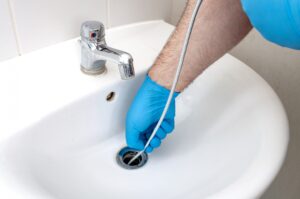Nothing is quite as upsetting as a slow-draining sink. You shouldn’t have to keep your eye on the water level while washing dishes in the kitchen sink, or shaving in the bathroom sink. This seems like an inconvenience at first until you realize what a slow-draining sink does to your plumbing system on a grand scale. If you’re not even sure what the problem is, or if you need a plumber in Cuyahoga Falls, OH, this post will help. For additional tips, see how to protect your plumbing when you have kids.
Debris Builds Up in the Drain
Debris can be anything from scraps of paper towels, toilet paper, and hairs that collect in your drains. Of course, it depends on which sink it is, but different debris can find its way into just about any drain.
In the kitchen, it could be scraps of food, hairs that fall from your head while doing dishes, and other forms of kitchen waste that get knocked from the counter into the drain. Debris can be knocked loose, provided you have the right experience and tools.
When debris accumulates, it can be tempting to put a chemical down the drain that you remember from a commercial or saw at the hardware store. But these can actually damage your drain and make it easier for leaks to occur. You need professionals to carry this out. If left untreated, this buildup can lead to what causes water to come through your kitchen floor, a more serious plumbing concern.
Your P-Trap Is Clogged
The P-trap is a small bend in your pipe that holds a bit of water in it, and it’s for a good reason–to keep horrible odors and methane from coming up through your pipes. That wouldn’t exactly be pleasant.
When your P-trap is clogged, your sink will drain slower, and you may even notice a bit of a smell rising from the drain. The solution here is usually unscrewing the P-trap (and having a bucket handy to catch whatever may fall out). If this isn’t something you’re comfortable with, or you anticipate other problems to pop up as well, it’s best to seek professional assistance.
Grease in the Drains
Grease isn’t supposed to go down your drain. We all hear it, we know it, but nobody’s ever really explained why. It’s because it accumulates on the sides of your pipes, slowly adding layer upon layer of grease until it constricts the flow of water, which can limit how your sink drains. When grease becomes a persistent issue, it can lead to more severe blockages or even slab leaks with major problems.
Before you run to the kitchen and pour dishwashing detergent in the drain–it’s not going to work like getting grease off of a frying pan. The grease has had time to solidify, so it’s much harder to move. This is where professional tools play a huge role in your drain’s recovery.
It’s Time for a Pipe Inspection
Not sure what the problem in your pipes could be? That’s okay–we can figure it out for you. It’s time to take control of your home plumbing by calling the experts. We’ll take a look at your drains, what we can do to clear them out, and how to stop all your slow-draining sinks across your entire home.
Contact Crown Group Ohio today to schedule your plumbing se services as soon as possible.

